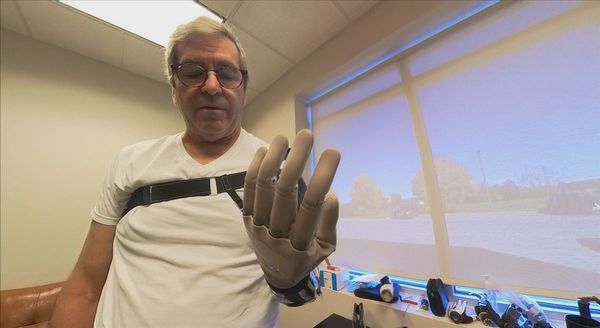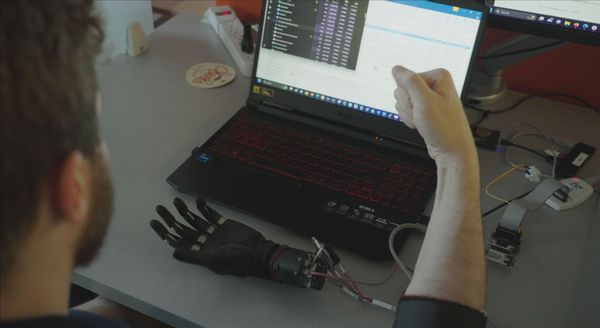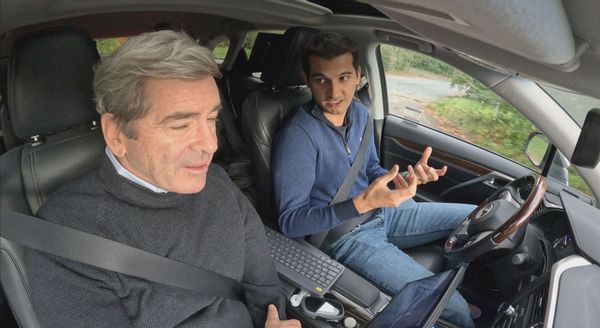
Forty-six years ago, PBS' "NOVA" series debuted its first documentary about artificial intelligence. "The Mind Machines" featured many of the field's foremost voices, including Arthur C. Clarke, the man who dreamed up "2001: A Space Odyssey" and its cold, calculating HAL 9000, one of the 20th century's defining AI nightmares.
"I think that what we’re doing now is, in a sense, training our own successors," Clarke warned at the outset.
"NOVA: A.I. Revolution," which premiered this week, doesn't include that observation from Clarke. Instead, it quotes what he said next: "We've seen the first crude beginnings of artificial intelligence. It doesn't really exist yet at any level because our most complex computers are still morons — high-speed morons — but still morons. Nevertheless, we have the possibility of machines that can outpace their creators and therefore become more intelligent than us."
Excluding Clarke’s opener doesn't fundamentally change the meaning of the whole statement, but knowing what's been omitted clarifies the intent of "A.I. Revolution" and its producer and host Miles O'Brien.
That first statement speaks to our prevailing fears concerning AI, which aren't entirely unfounded. Placing guardrails around film and TV studios' usage of AI was a central fight in last year's dual strikes by the Writers Guild of America and SAG-AFTRA. (Salon's unionized employees are represented by the WGA East.)
Other industries' workers — journalism included — are rightly wary about its incursion into their fields, as well.
While O'Brien and the experts featured in "A.I. Revolution" acknowledge that those fears aren't unfounded, they also would like us to take a breath and consider the profoundly beneficial aspects of artificial intelligence.
"A.I. Revolution," therefore, is an entry-level course on the subject, explaining how artificial intelligence works and featuring how it's been used to innovate pharmaceutical research, assist in earlier cancer diagnoses and hasten developments in robotics — topics that haven't been explored with much nuance.
"What really bothers me is that in the rest of the media, they'll put on a credible technologist — somebody who is part of the technology community and understands things — and they'll pick the person who sincerely believes that we're facing an 'existential threat,'" O’Brien said in a February conversation that took place at the Television Critics Association's winter press tour in Pasadena, Calif.
"Then nobody will actually interrogate that," he continued. "They will just feed off of hearing that hysterical thing. They'll say, 'Well, that guy must know what he's talking about because he's a scientist.' In fact, it's pretty easy to start asking some follow-up questions that reveal just how speculative something like that is."

"It's just irresponsible to throw that out there and enjoy the fact that you're getting people all revved up and get their intention," O’Brien said in February.
It seems Silicon Valley agrees with O’Brien: "Sam Altman's act may be wearing thin" is the headline of a Business Insider story published on Tuesday.
But the "NOVA" host has a very personal reason for clarifying the record on AI. O'Brien used to be CNN's top science correspondent before the cable channel laid off the entire unit in 2008. Afterward, he appeared as an analyst on CNN, while mainly working for PBS.
In 2014, while on an assignment in the Philippines, a heavy equipment case fell on his left forearm, requiring an amputation above the elbow. Ten years later, this "NOVA" episode depicts his journey to live with a new AI-driven prosthetic — one of many medical and scientific engineering developments ameliorated by computational work.
Woven through his experience of adapting to his new prosthetic are examples of how AI has been quietly accelerating medical diagnostic research and treatment innovations for years now.

Much of what we know is based on movies and consumer interactions. Company websites use conversational AI-driven chatbots to interact with customers seeking answers to common questions. Employing automated tools to streamline research or clean up our grammar is part of our daily workflow.
Then there are the non-essential uses, such as generating elaborate artwork inspired by random search terms.
There's also the tantalizingly close promise of entirely autonomous self-driving vehicles. In "A.I. Revolution," O'Brien rides in an experimental car with Dr. Alexander Amini, an MIT postdoctoral researcher. The auto navigates an environment without being reliant on an established map program due to experimental technology inspired by a tiny organism.

One truth O'Brien shows is that he has nothing to fear related to his arm becoming self-aware and doing him harm. His initial field tests are frustrating.
Amini, who joined O'Brien at PBS's press event along with Dr. Petrina Kamya, the head of AI platforms at Insilico Medicine, acknowledges that "in reality, everyone agrees that there are very big negatives. It's only upon how we deal with those negatives going forward that there seems to be some division."
He and Kamya worry that a fear-based approach to AI regulation will slow down the life-saving progress being made in a variety of research fields.
"Humans have problems today that we don't know how to solve," Amini offered as part of our conversation. "That's the reality of the situation: We have severe problems in the world — cancer, climate change models, all different types of issues — that are fundamentally lacking solutions."
"We are moving in the right direction, largely due to technology over the past 50 years that has advanced our progress in these domains," he continued, "and AI will accelerate those advances even further."
So why don't we know more about this side of artificial intelligence? Simply put, as Kamya said, it's very technical, and "the people who are very familiar with the technical aspects of AI, they'll use terms they all understand that aren't necessarily easy to digest them and speak about in layman's terms."
This episode is one way she and the other "A.I. Revolution" participants hope to make what they do more accessible. "We need more coverage like this," O’Brien insisted. "People should understand the good, the bad and the ugly — not just the ugly part."
"NOVA: A.I. Revolution" is available on YouTube and streaming at pbs.org or via the PBS app.







